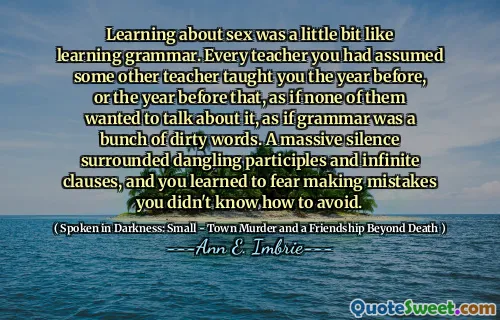
Learning about sex was a little bit like learning grammar. Every teacher you had assumed some other teacher taught you the year before, or the year before that, as if none of them wanted to talk about it, as if grammar was a bunch of dirty words. A massive silence surrounded dangling participles and infinite clauses, and you learned to fear making mistakes you didn't know how to avoid.
This quote poignantly captures the silence and taboo that often surround sensitive subjects like sex. Much like learning complex grammar rules, the learning process about sex can be shrouded in secrecy, shame, or awkwardness, leaving individuals to piece together knowledge from scattered, unreliable sources. The analogy highlights how topics deemed inappropriate or uncomfortable tend to be avoided by educators and society at large, resulting in a collective silence that stifles open, honest conversations. Just as dangling participles or intricate clauses can trip up a language learner, misconceptions about sex can lead to confusion and fear. The fear of making mistakes—of saying the wrong thing or revealing ignorance—creates further barriers to understanding and healthy communication. This clouds the natural curiosity and desire to learn, often leaving individuals with only misinformation or embarrassment. Society's reluctance to address such topics openly perpetuates shame and inhibits healthy development. The metaphor underscores the importance of destigmatizing conversations around sex—introducing education that is frank, respectful, and comprehensive helps dismantle the silence, fostering understanding and reducing guilt. On a broader level, it exemplifies how societal taboos can impede education and personal growth, emphasizing the need for honest dialogue in all areas of human experience. Recognizing these patterns may help educators and communities create safer spaces for learning, reducing needless shame and encouraging acceptance and clarity about a natural part of life.





